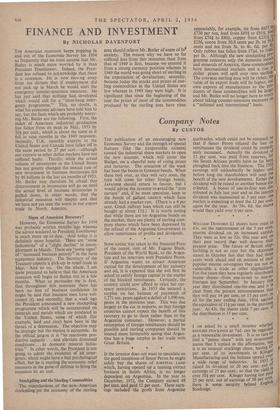FINANCE AND INVESTMENT
NICHOLAS DAVENPORT
By
THE American recession keeps popping in and out of the Economic Survey for 1954 so frequently that we must assume that Mr. Butler is much more worried by it than President Eisenhower. Indeed, the Presi- dent has refused to acknowledge that there is a recession. He is now moving away from his dictum that if employment did not pick up in March he would start the emergency counter-recession measures. He has just said that nothing had developed which would call for a "slam-bang emer- gency programme." This, no doubt, is what his economic advisers have told him to say, but the facts which are probably worry- ing Mr. Butler are the following. First, the index of American industrial production has fallen from its peak in May, 1953 by 101 per cent., which is about the same as it fell in nine months in the 1949 recession. Secondly, U.K. monthly exports to the United States and Canada have fallen off in the same period by 27 per cent.—although our exports to other dollar markets have not suffered badly. Thirdly, while the actual volume of inventories in the United States has not greatly changed the annual rate of new investment in business inventories fell by $6 billions in the last six months of 1953. Mr. Butler may therefore be afraid that disinvestment in inventories will go on until the actual level of business inventories is pulled down, in other words, that the industrial recession will deepen and that we have not yet seen the worst in our export trade to North America.
Signs of American Recovery?
However, the Economic Survey for 1954 was probably written months ago whereas the advice tendered to President Eisenhower is much more up to date. And today it is definitely more hopeful. There are "some indications" of a "slight decline" in unem- ployment in March. There are "some signs" of "increased business activity" in the farm equipment industry. The Secretary of the Treasury expects a pick-up in retail trade in May. And so on. On the whole, I am quite prepared to believe that the American recession will begin to flatten out in a few months. What so persuades me is first, that throughout this, recession there has been no loss of business confidence (it might be said that business men have wel- comed it), and secondly, that a week ago the President announced a new stockpiling programme which will be concentrated on minerals and metals which are produced in the United States, some of which (for example, lead and zinc) have been in the throes of a depression. The objective may be strategic but the motive is economic. In the official jargon it is "to reactivate pro- ductive capacity ... and alleviate distressed conditions ... in domestic mineral indus- tries." In other words, the President is not going to admit the existence of an emer- gency, which might have a bad psychological effect, but he is starting the economic relief measures in the guise of defence to bring the recession to an end. area should relieve Mr. Butler of some of hi' anxiety. The reason why • we have so far suffered less from this recession than from that of 1949 is first, because we entered it from a strong currency position whereas in 1949 the world was going short of sterling in the expectation of devaluation; secondly, because today the stocks and prices of ster- ling commodities in the United States are low whereas in 1949 they were high. It is significant that since the beginning of the year the prices of most of the commodities produced by the sterling area have risen appreciably, for example, tin from £657.1 £730 per ton, lead from L891 to £9111, Zino from £74$ to £801, copper from £2311 1 £236, cocoa from 50.8 cents per lb. to 59;. cents and tea from 3s. to 4s. 6d. per i° Only rubber has fallen from 171d. to 1610 per lb. Although the new stockpiling PO' gramme concerns only the domestic metal" and minerals of America, these commoditle9 have international markets and a rise. In dollar prices will spill over into sterling. \ The overseas sterling area will be richer, the value of its export trade will be higher, 0°1 own exports of manufactures to the Pr°• ducers of these commodities will be larger and Mr. Butler will no longer have to word about taking-counter-recession measures on a "national and international" ,basis.


















































 Previous page
Previous page